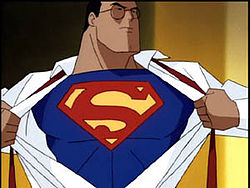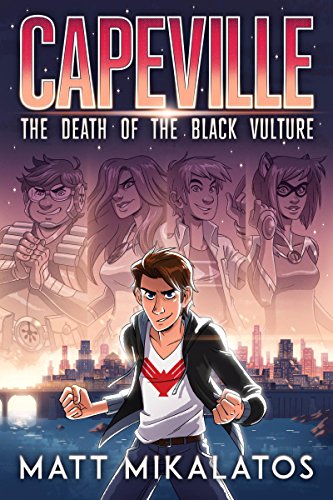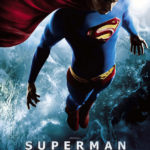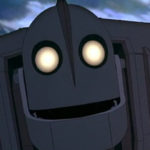The Once and Future Fan: Rediscovering My Love For Superheroes
 When I was a kid, I was the biggest Star Wars fan I knew.
When I was a kid, I was the biggest Star Wars fan I knew.
I was three years old when I first saw the movie (never called “A New Hope” in those days). In the years to come I had Star Wars sheets, a Darth Vader poster over my bed, an ever-expanding collection of toys, and various homemade Star Wars accouterments. I baked Wookie Cookies. My mom baked an R2-D2 birthday cake. I dressed as Luke Skywalker for Halloween one year, and Chewbacca the next. I knew the name of ever creature who crossed the screen, had read the novel adaptation so I could know what happened in the deleted scenes, read all the spinoff novels (there were only a handful) and carefully studied “The Force of Star Wars,” a Christian dissection of the movie that showed how the movie was a carefully veiled Christian allegory (a book that fell apart as more movies released).
Those few kids who liked Star Wars on a similar level were my best friends. They were my tribe, my community. There was never a question about what we would play. Instead, we fought over who got to be Han Solo.
Over time, my friends and I lost our title as “biggest fans” as people started to have Jedi weddings, get Darth Vader tattoos, and sleep inside tauntauns. I couldn’t keep up with the proliferation of tie-ins, comic books, the “expanded universe” and all the cartoons and fan fiction. What happened to the good old days, I wondered, when being a true fan meant you knew who Mace and Cindel were and had fond memories of Jaxxon, the smuggler from Coachella Prime? A slow disenfranchisement set in, where I went from being a Star Wars expert to a true fan to a fan, and from a fan to a guy who liked some old movies.
At least I still had comic books.
Except comics have gone through a similar commodification: the big companies which own the characters realized the fans wanted more, so they provided it. Toys, movies, cartoons, shirts, TV shows, keychains, car decals. These are all things I’ve wanted since I was a kid (except the car decals . . . that one never occurred to me).
A terrible side effect of this commodification has been a calcification of the status quo. Characters can’t be killed anymore; money has made everyone immortal. Character marriages might last, or they might also be ret-conned or removed. Peter Parker, the amazing Spider-Man, used to be married and in fact he had a baby with Mary Jane (a baby who was kidnapped by the Green Goblin and then, strangely, forgotten, then turned out to have died, all making way for a big reveal that restored the status quo with a return of Aunt May, who had been thought dead). Of course none of those things mattered much after (in a literal deal with the devil), Peter Parker and Mary Jane’s marriage was annulled by way of continuity reset.
 At some point, everything in a hero’s life has to be returned to zero. We can’t change them too much or mess with the formula, because messing with the formula could mess with the bottom line. Right now in the comics Wolverine is dead (being replaced with a future timeline version of Wolverine and a female, cloned version of Wolverine). Superman is dead (though his previous incarnation from another universe is alive, along with his wife and son AND a Clark Kent who appears to be the Clark who used to be the now-dead Superman). Captain America is a long term sleeper agent Nazi (he was dead not too long ago, and then an elderly man), and Batman has died more than once in recent memory, though he’s chugging along just fine in the current books. They’ll all be returned to “normal” soon enough.
At some point, everything in a hero’s life has to be returned to zero. We can’t change them too much or mess with the formula, because messing with the formula could mess with the bottom line. Right now in the comics Wolverine is dead (being replaced with a future timeline version of Wolverine and a female, cloned version of Wolverine). Superman is dead (though his previous incarnation from another universe is alive, along with his wife and son AND a Clark Kent who appears to be the Clark who used to be the now-dead Superman). Captain America is a long term sleeper agent Nazi (he was dead not too long ago, and then an elderly man), and Batman has died more than once in recent memory, though he’s chugging along just fine in the current books. They’ll all be returned to “normal” soon enough.
Basically, the big corporate comics have a great deal of conflict but precious little transformation. Everything has to be reset, rebooted, relaunched, and retold.
One other painful experience for comic book lovers is the rotating creators, sometimes bringing amazing stories, and sometimes bringing stories that seem to undermine everything you love about a character. For me, the best example is the current cinematic expression of Superman. Superman is Christopher Reeve and SuperFriends. He’s charming and kind and while there may be problems, he always overcomes, even if he has to reverse time in a climactic moment that makes about as much sense as gaining super powers by landing on another planet. For years our cinematic Superman has been someone I don’t recognize or enjoy, because the writers have moved him from “boy scout” to “slightly-less-than-regular guy who is doing his best.” He’s dour and painfully unaware of people around him and, honestly, a little slow-witted.
Don’t get me wrong, I still like Star Wars. I still buy comics. I still have fond memories of my fandom. But I can’t, for instance, wear a Superman shirt and feel totally committed. I have mixed feelings.
These are the sorts of things that led me to create my own superhero universe. I wanted some characters who could be part of stories I found compelling and interesting, where there were real stakes and real drama and real risks. If a character dies in my universe, they’re not going to star in a spinoff series two months later. And because there are real stakes and there is real transformation, I find the stories more exciting, compelling and, I hope, more beneficial for the audience. (And, a side benefit, I get to be the biggest fan of all, because I know more about the characters and the world they inhabit than anyone else does. Which isn’t a prerequisite for enjoying something, but it sure is fun.)
 The main characters in Capeville are teenagers, partly because of my love of comics like Legion of Super Heroes and Teen Titans, but also because I want them to have room to grow, to change, to learn and be transformed. The main five teens are John Ajax (a kid with no powers), Lightning Cat (a young woman who creates electricity through kinetic action), Jupiter Girl (a Jovian powerhouse), Pronto (the speedster) and the Gecko (a wall-crawling superhero with more experience than the rest of them).
The main characters in Capeville are teenagers, partly because of my love of comics like Legion of Super Heroes and Teen Titans, but also because I want them to have room to grow, to change, to learn and be transformed. The main five teens are John Ajax (a kid with no powers), Lightning Cat (a young woman who creates electricity through kinetic action), Jupiter Girl (a Jovian powerhouse), Pronto (the speedster) and the Gecko (a wall-crawling superhero with more experience than the rest of them).
I have five books planned, and there are going to be some amazing challenges in their future. None of them will come through it unscathed. But they’re going to learn about family, and friendship and what it means to be a hero, and (spoiler) they’re going to choose to embrace all three of those things.
I love these characters. My artist, M.S. Corley, and I send emails back and forth as we create the look of the characters, and I cannot wait for each new iteration. I made a Black Vulture t-shirt, which I wear happily. I find myself doodling pictures of the characters in my notebook.
I’m a fan again! And I’m having more fun than ever.
How about you? What’s your fan experience? How does that intersect with your writing, your reading, or your theology?
For more information about Capeville, check out the Capeville website. Read some of the first pages here.
– – – – –

Matt Mikalatos is an author with seven published books, some of which are theology and some of which are speculative fiction, and one of which is a comedy theology novel about a werewolf looking for redemption by going to church with his idiot neighbor. Check out his website at http://www.mikalatos.com











































I read this to my hubby and showed him the artwork. We’ll read it purely because there is a catgirl. (He’s been collecting the Critter comics for the same reason.) When will the first issue be out? Or are you doing graphic novels?
Well it’s actually a novel! It’s out already. Go to http://www.capeville.net and you can find pictures of Lightning Cat and links to buy the book!
The artist and I love working on this and with each other, so if things are successful enough we’d love to do either a heavily illustrated version on future books or a comic!
I’m always looking for books for my 11 year old brother! This looks like it might be right up his alley.
I’m pretty sure 100% of 11 year olds would love this book.